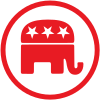
Back Republikeinse Party (Verenigde State) Afrikaans Republikanische Partei ALS ሪፐብሊካን ፓርቲ (አሜሪካ) Amharic الحزب الجمهوري (الولايات المتحدة) Arabic ܓܒܐ ܩܘܛܢܝܐ (ܐܘܚܕܢܐ ܡܚܝܕܐ) ARC الحزب الجمهورى فى امريكا ARZ Partíu Republicanu de los Estaos Xuníos AST Respublikaçılar Partiyası (ABŞ) Azerbaijani جومهوریتچی حیزبی (بیرلشمیش ایالتلر) AZB Partai Républik (Amérika Serikat) BAN
Republican Party | |
|---|---|
 | |
| Abbreviation | GOP |
| Chairperson | Michael Whatley |
| Governing body | Republican National Committee |
| Speaker of the House | Mike Johnson |
| Senate Minority Leader | Mitch McConnell |
| House Majority Leader | Steve Scalise |
| Founders | Alvan E. Bovay[1] Henry J. Raymond[2] |
| Founded | March 20, 1854 Ripon, Wisconsin, U.S. |
| Merger of | Northern Whigs[3][4][5][6] Free Soil Party[7] Anti-Nebraska movement[8] |
| Headquarters | 310 First Street SE, Washington, D.C., U.S. |
| Student wing | College Republicans High School Republican National Federation |
| Youth wing | |
| Women's wing | National Federation of Republican Women |
| Overseas wing | Republicans Overseas |
| Ideology | Majority: Factions: |
| Political position | Right-wing[20][21][22][23] |
| International affiliation | |
| Colors | Red |
| Senate | 49 / 100 |
| House of Representatives | 218 / 435 |
| State Governors | 27 / 50 |
| State upper chambers | 1,110 / 1,973 |
| State lower chambers | 2,948 / 5,413 |
| Territorial Governors | 0 / 5 |
| Territorial upper chambers | 12 / 97 |
| Territorial lower chambers | 9 / 91 |
| Election symbol | |
 | |
| Website | |
| gop | |
The Republican Party, also known as the GOP (Grand Old Party), is one of the two major contemporary political parties in the United States. It emerged as the main political rival of the then-dominant Democratic Party in the mid-1850s, and the two parties have dominated American politics ever since.
The party was founded in 1854 by anti-slavery activists who opposed the Kansas–Nebraska Act, an act which allowed for the potential expansion of chattel slavery into the western territories of Kansas and Nebraska.[25] It supported classical liberalism and economic reform[26] while opposing the expansion of slavery into the free territories. The party initially had a very limited presence in the South, but was successful in the North. By 1858, it had enlisted most former Whigs and former Free Soilers to form majorities in nearly every northern state. White Southerners became alarmed at the threat to the slave trade. With the 1860 election of Abraham Lincoln, the first Republican president, the deep Southern states seceded from the United States.
Under the leadership of Lincoln and a Republican Congress, the Republican Party led the fight to defeat the Confederate States in the American Civil War, preserving the Union and abolishing slavery. Afterward, the party largely dominated the national political scene until the Great Depression in the 1930s, when it lost its congressional majorities and the Democrats' New Deal programs proved popular. Dwight D. Eisenhower's election was a rare break in between Democratic presidents and he presided over a period of increased economic prosperity after World War II. His former vice president Richard Nixon carried 49 states in 1972 with what he touted as his silent majority. The 1980 election of Ronald Reagan realigned national politics, bringing together advocates of free-market economics, social conservatives, and Cold War foreign policy hawks under the Republican banner.[27] Since 2008, Republicans have faced significant factionalism within the party's ranks.[18][28]
In the 21st century, the party receives its strongest support from rural voters, evangelical Christians, men, senior citizens, and white voters without college degrees. On economic issues, the party has maintained a pro-business attitude since its inception. It has a neoliberal outlook, supporting low taxes and deregulation while opposing socialism, labor unions and single-payer healthcare. A populist faction supports economic protectionism. On social issues, it advocates for restricting the legality of abortion, discouraging and often prohibiting recreational drug use, promoting gun ownership and easing gun restrictions, overturning the legality of same-sex marriage and opposing the transgender rights movement. In foreign policy, the party establishment supports neoconservatism and interventionism, while the populist faction promotes isolationism and non-interventionism.
- ^ The Origin of the Republican Party by Prof. A. F. Gilman, Ripon College, WI, 1914.
- ^ Widmer, Ted (March 19, 2011). "A Very Mad-Man". Opinionator. The New York Times. Retrieved March 12, 2017.
- ^ "Political Parties | Northern Illinois University Digital Library". digital.lib.niu.edu. Retrieved May 27, 2024.
- ^ Howe, Daniel Walker (Winter 1995). "Why Abraham Lincoln Was a Whig". Journal of the Abraham Lincoln Association. 16 (1). hdl:2027/spo.2629860.0016.105. ISSN 1945-7987.
- ^ "Historical Context: The Breakdown of the Party System | Gilder Lehrman Institute of American History". www.gilderlehrman.org. Retrieved May 27, 2024.
- ^ "Major American Political Parties of the 19th Century". Norwich University Resource Library. Retrieved May 28, 2024.
- ^ McPherson, James (2003) [1988]. The Illustrated Battle Cry of Freedom: The Civil War Era. Oxford University Press. p. 129. ISBN 978-0-19-974390-2.
- ^ James M. McPherson, Ordeal by Fire: Volume I. The Coming of War, second edition (ISBN 0-07045837-5) p. 94.
- ^ Smith, Robert C. (2021). "Ronald Reagan, Donald Trump, and the Future of the Republican Party and Conservatism in America". American Political Thought. 10 (2): 283–289. doi:10.1086/713662. S2CID 233401184. Retrieved September 21, 2022.
- ^ Morgan, David (August 21, 2023). "Republican feud over 'root canal' spending cuts raises US government shutdown risk". Reuters. Retrieved May 13, 2024.
- ^ Gannon, Thomas M. (July–September 1981). "The New Christian Right in America as a Social and Political Force". Archives de Sciences Sociales des Religions. 26 (52–1). Paris: Éditions de l'EHESS: 69–83. doi:10.3406/assr.1981.2226. ISSN 0335-5985. JSTOR 30125411.
- ^ Ben Barka, Mokhtar (December 2012). "The New Christian Right's relations with Israel and with the American Jews: the mid-1970s onward". e-Rea. 10 (1). Aix-en-Provence and Marseille: Centre pour l'Édition Électronique Ouverte on behalf of Aix-Marseille University. doi:10.4000/erea.2753. ISSN 1638-1718. S2CID 191364375.
- ^ Palmer, Randall; Winner, Lauren F. (2005) [2002]. "Protestants and Homosexuality". Protestantism in America. Columbia Contemporary American Religion Series. New York: Columbia University Press. pp. 149–178. ISBN 9780231111317. LCCN 2002023859.
- ^ "Content Pages of the Encyclopedia of Religion and Social Science". Archived from the original on March 3, 2016.
- ^ Williams 2010, pp. 1, 2.
- ^ Trollinger, William (October 8, 2019). "Fundamentalism turns 100, a landmark for the Christian Right". The Conversation. ISSN 2201-5639. Archived from the original on May 7, 2022. Retrieved July 3, 2022.
The emergent Christian Right attached itself to the Republican Party, which was more aligned with its members' central commitments than the Democrats.
- ^ Wilbur, Miller (2012). "Libertarianism". The Social History of Crime and Punishment in America. Vol. 3. Thousand Oaks, California: SAGE Publications. pp. 1006–1007. ISBN 978-1-4129-8876-6.
While right-libertarianism has been equated with libertarianism in general in the United States, left-libertarianism has become a more predominant aspect of politics in western European democracies over the past three decades. ... Since the 1950s, libertarianism in the United States has been associated almost exclusively with right-libertarianism ... As such, right-libertarianism in the United States remains a fruitful discourse with which to articulate conservative claims, even as it lacks political efficacy as a separate ideology. However, even without its own movement, libertarian sensibility informs numerous social movements in the United States, including the U.S. patriot movement, the gun-rights movement, and the incipient Tea Party movement.
- ^ a b Cite error: The named reference
Cohn2023was invoked but never defined (see the help page). - ^ Cite error: The named reference
Arhin-2023was invoked but never defined (see the help page). - ^ McKay, David (2020), Crewe, Ivor; Sanders, David (eds.), "Facilitating Donald Trump: Populism, the Republican Party and Media Manipulation", Authoritarian Populism and Liberal Democracy, Cham: Springer International Publishing, pp. 107–121, doi:10.1007/978-3-030-17997-7_7, ISBN 978-3-030-17997-7, retrieved June 13, 2024,
the Republicans changed from being a right of centre coalition of moderates and conservatives to an unambiguously right-wing party that was hostile not only to liberal views but also to any perspective that clashed with the core views of an ideologically cohesive conservative cadre of party faithfuls
- ^ Greenberg, David (January 27, 2021). "An Intellectual History of Trumpism". POLITICO Magazine. Retrieved June 13, 2024.
The larger ideology that the president-elect represents is a post-Iraq War, post-crash, post-Barack Obama update of what used to be called paleoconservatism: On race and immigration, where the alt-right affinities are most pronounced, its populist ideas are carrying an already right-wing party even further right.
- ^ Wineinger, Catherine; Nugent, Mary K. (January 2, 2020). "Framing Identity Politics: Right-Wing Women as Strategic Party Actors in the UK and US". Journal of Women, Politics & Policy. 41 (1): 5. doi:10.1080/1554477X.2020.1698214. ISSN 1554-477X.
- ^ Jessoula, Matteo; Natili, Marcello; Pavolini, Emmanuele (August 8, 2022). "'Exclusionary welfarism': a new programmatic agenda for populist right-wing parties?". Contemporary Politics. 28 (4): 447–449. doi:10.1080/13569775.2021.2011644. ISSN 1356-9775.
- ^ "Members". IDU. Archived from the original on July 16, 2015.
- ^ Brownstein, Ronald (November 22, 2017). "Where the Republican Party Began". The American Prospect. Archived from the original on December 29, 2021.
- ^ Fornieri, Joseph R.; Gabbard, Sara Vaughn (2008). Lincoln's America: 1809–1865. SIU Press. p. 19. ISBN 978-0809387137. Archived from the original on July 24, 2019. Retrieved February 4, 2018.
- ^ Devine, Donald (April 4, 2014). "Reagan's Philosophical Fusionism". The American Conservative. Archived from the original on April 4, 2023. Retrieved January 18, 2023.
- ^ Broadwater, Luke (October 23, 2023). "'5 Families' and Factions Within Factions: Why the House G.O.P. Can't Unite". The New York Times. ISSN 0362-4331. Archived from the original on October 27, 2023. Retrieved October 27, 2023.
Cite error: There are <ref group=lower-alpha> tags or {{efn}} templates on this page, but the references will not show without a {{reflist|group=lower-alpha}} template or {{notelist}} template (see the help page).
© MMXXIII Rich X Search. We shall prevail. All rights reserved. Rich X Search